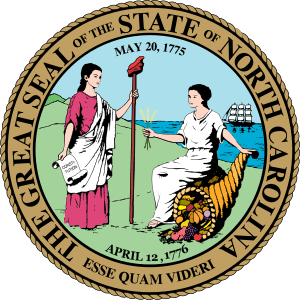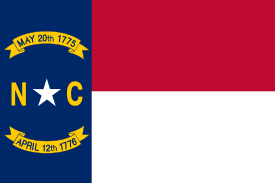Davidson County, North Carolina
Davidson County is a county located in the U.S. state of North Carolina. As of the 2010 census, the population was 162,878.[1] Its county seat is Lexington,[2] and its largest city is Thomasville.
Davidson County | |
|---|---|
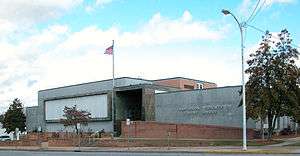 Davidson County Courthouse in Lexington | |
 Seal | |
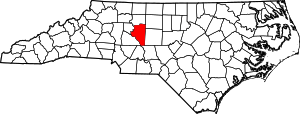 Location within the U.S. state of North Carolina | |
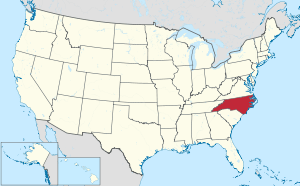 North Carolina's location within the U.S. | |
| Coordinates: 35°47′N 80°13′W | |
| Country | |
| State | |
| Founded | 1822 |
| Named for | William Lee Davidson |
| Seat | Lexington |
| Largest city | Thomasville |
| Area | |
| • Total | 567 sq mi (1,470 km2) |
| • Land | 553 sq mi (1,430 km2) |
| • Water | 14 sq mi (40 km2) 2.5%% |
| Population | |
| • Estimate (2019) | 167,609 |
| • Density | 295/sq mi (114/km2) |
| Time zone | UTC−5 (Eastern) |
| • Summer (DST) | UTC−4 (EDT) |
| Congressional district | 13th |
| Website | www |
Davidson County is included in the Winston-Salem, NC Metropolitan Statistical Area, which is also included in the Greensboro-Winston-Salem-High Point, NC Combined Statistical Area.
Parts of Davidson County are in the Yadkin Valley wine region.
History
The original North Carolina county of this name was created in 1786 what was then the far western portion of North Carolina, with its county seat at Nashville and a territory covering most of what is now Middle Tennessee. When Tennessee was established as a separate state in 1796, this county became Davidson County, Tennessee.
The current North Carolina county was formed in 1822 from Rowan County. It was named after Brigadier General William Lee Davidson, an American Revolutionary War general killed at the Battle of Cowan's Ford on the Catawba River in 1781.[3][4]
In 1911, a new county called Piedmont County was proposed, with High Point as its county seat, to be created from Guilford, Davidson and Randolph Counties. Many people appeared at the Guilford County courthouse to oppose the plan, vowing to go to the state legislature to protest. The state legislature voted down the plan in February 1911.[5][6]
Geography
According to the U.S. Census Bureau, the county has a total area of 567 square miles (1,470 km2), of which 553 square miles (1,430 km2) is land and 14 square miles (36 km2) (2.5%) is water.[7]
Davidson County is located entirely within the Piedmont region of central North Carolina. The Piedmont consists of gently rolling terrain frequently broken by hills or shallow valleys formed by rivers and streams. An exception to this terrain are the Uwharrie Mountains in the county's western and southwestern sections. The Uwharries are the oldest mountain range in North America, and at one time they rose to nearly 20,000 feet (6,100 m) above sea level. However, time has worn them down to little more than high hills; yet due to the relative flatness of the surrounding countryside they still rise from 250 to 500 feet (150 m) above their base. The highest point in the Uwharries - and the highest point in Davidson County - is High Rock Mountain in the county's southwestern corner. It has an elevation of 1,119 feet (341 m) above sea level.
National protected area
- Uwharrie National Forest (part)
Demographics
| Historical population | |||
|---|---|---|---|
| Census | Pop. | %± | |
| 1830 | 13,389 | — | |
| 1840 | 14,606 | 9.1% | |
| 1850 | 15,320 | 4.9% | |
| 1860 | 16,601 | 8.4% | |
| 1870 | 17,414 | 4.9% | |
| 1880 | 20,333 | 16.8% | |
| 1890 | 21,702 | 6.7% | |
| 1900 | 23,403 | 7.8% | |
| 1910 | 29,404 | 25.6% | |
| 1920 | 35,201 | 19.7% | |
| 1930 | 47,865 | 36.0% | |
| 1940 | 53,377 | 11.5% | |
| 1950 | 62,244 | 16.6% | |
| 1960 | 79,493 | 27.7% | |
| 1970 | 95,627 | 20.3% | |
| 1980 | 113,162 | 18.3% | |
| 1990 | 126,677 | 11.9% | |
| 2000 | 147,246 | 16.2% | |
| 2010 | 162,878 | 10.6% | |
| Est. 2019 | 167,609 | [8] | 2.9% |
| U.S. Decennial Census[9] 1790-1960[10] 1900-1990[11] 1990-2000[12] 2010-2013[1] | |||
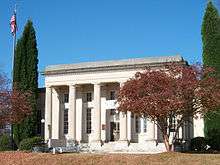
As of the census[13] of 2010, there were 149,331 people, 58,156 households, and 42,512 families residing in the county. The population density was 267 people per square mile (103/km²). There were 62,432 housing units at an average density of 113 per square mile (44/km²). The racial makeup of the county was 84.05% White, 11.14% Black or African American, 0.37% Native American, 0.82% Asian, 0.01% Pacific Islander, 1.66% from other races, and 0.94% from two or more races. 3.24% of the population were Hispanic or Latino of any race.
There were 58,156 households out of which 32.70% had children under the age of 18 living with them, 58.00% were married couples living together, 10.80% had a female householder with no husband present, and 26.90% were non-families. 22.90% of all households were made up of individuals and 8.80% had someone living alone who was 65 years of age or older. The average household size was 2.50 and the average family size was 2.92.
In the county, the population was spread out with 24.30% under the age of 18, 7.60% from 18 to 24, 31.20% from 25 to 44, 24.10% from 45 to 64, and 12.80% who were 65 years of age or older. The median age was 37 years. For every 100 females there were 96.00 males. For every 100 females age 18 and over, there were 93.70 males.
The median income for a household in the county was $38,640, and the median income for a family was $46,241. Males had a median income of $31,287 versus $23,622 for females. The per capita income for the county was $18,703. About 7.00% of families and 10.10% of the population were below the poverty line, including 13.30% of people under age 18 and 12.10% of those age 65 or over.
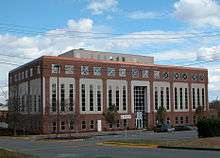
Communities
Cities
- High Point (part)
- Lexington (county seat)
- Thomasville
Townships
- Abbotts Creek
- Alleghany
- Arcadia
- Boone
- Conrad Hill
- Cotton Grove
- Emmons
- Hampton
- Healing Spring
- Jackson Hill
- Lexington
- Midway
- Reedy Creek
- Silver Hill
- Thomasville
- Tyro
- Yadkin College
Unincorporated communities
Politics, law and government
Davidson is a powerfully Republican county in presidential elections. No Democratic presidential nominee has ever carried the county since Franklin D. Roosevelt defeated Thomas E. Dewey by a mere ten votes out of almost nineteen thousand in 1944, and indeed the last Democrat to garner one-third of the county’s ballots has been Jimmy Carter in 1980.
| Year | Republican | Democratic | Third parties |
|---|---|---|---|
| 2016 | 72.6% 54,317 | 24.2% 18,109 | 3.3% 2,430 |
| 2012 | 69.6% 49,383 | 29.1% 20,624 | 1.3% 928 |
| 2008 | 66.2% 45,419 | 32.7% 22,433 | 1.1% 729 |
| 2004 | 70.7% 42,075 | 28.9% 17,191 | 0.4% 230 |
| 2000 | 68.0% 35,387 | 31.1% 16,199 | 0.9% 461 |
| 1996 | 58.8% 24,797 | 32.2% 13,593 | 9.0% 3,817 |
| 1992 | 50.0% 24,869 | 33.1% 16,462 | 16.9% 8,394 |
| 1988 | 68.1% 28,374 | 31.7% 13,215 | 0.2% 73 |
| 1984 | 72.6% 30,471 | 27.3% 11,469 | 0.2% 61 |
| 1980 | 59.6% 22,794 | 38.1% 14,579 | 2.3% 896 |
| 1976 | 51.1% 18,813 | 48.5% 17,859 | 0.5% 183 |
| 1972 | 74.8% 24,875 | 23.1% 7,691 | 2.1% 696 |
| 1968 | 46.6% 16,678 | 21.2% 7,594 | 32.2% 11,544 |
| 1964 | 55.7% 17,292 | 44.3% 13,735 | |
| 1960 | 58.9% 18,797 | 41.1% 13,118 | |
| 1956 | 61.8% 16,178 | 38.2% 9,987 | |
| 1952 | 56.7% 14,299 | 43.3% 10,931 | |
| 1948 | 49.3% 8,539 | 46.2% 7,991 | 4.5% 784 |
| 1944 | 50.0% 9,445 | 50.0% 9,455 | |
| 1940 | 38.6% 6,978 | 61.4% 11,084 | |
| 1936 | 41.4% 7,656 | 58.6% 10,844 | |
| 1932 | 39.0% 6,051 | 60.0% 9,292 | 1.0% 157 |
| 1928 | 63.2% 8,960 | 36.8% 5,220 | |
| 1924 | 48.7% 6,227 | 50.9% 6,507 | 0.4% 56 |
| 1920 | 55.4% 5,960 | 44.6% 4,797 | |
| 1916 | 51.0% 2,801 | 48.7% 2,675 | 0.2% 12 |
| 1912 | 29.3% 1,509 | 48.2% 2,484 | 22.6% 1,165 |
Davidson County is a member of the regional Piedmont Triad Council of Governments.
Davidson County gained national attention when Gerald Hege, Sheriff from 1994–2003, became a minor celebrity for his unconventional prisoner treatment methods.
Education
Davidson County is served by Davidson County Schools; however, the cities of Thomasville and Lexington have their own school districts. Davidson County Schools is one of the county's largest employers.
Davidson County is also served by Davidson County Community College, a comprehensive community college that is a member school of the North Carolina Community College System. Davidson County Community College was chartered in 1958 as an Industrial Education Center designed to provide adults with the education and skills needed to move from an agricultural to a manufacturing-based economy.
In 1965, the institution was chartered as Davidson County Community College. The Associate in Arts and Associate in Science degrees were added to the existing Associate in Applied Science degree, Diploma, and Certificate programs. University transfer courses were added in 1966. In 1997, the College participated in the Comprehensive Articulation Agreement (CAA) that allows college transfer students to move easily to the 16 UNC schools, as well as many independent college and universities. Presently the Davidson Campus has grown to 11 buildings and two emergency services training facilities on approximately 97 acres (390,000 m2).
Attractions
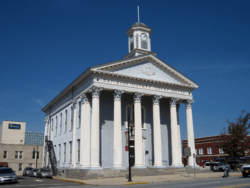
Festivals
One of the county's most famous attractions is the yearly Lexington Barbecue Festival, held in the city of Lexington during the month of October, bringing in over 100,000 visitors from all over the southeastern U.S. There is also a yearly Davidson County Agriculture Fair held in September. Thomasville hosts an annual "Everybody's Day Festival",[15] the longest running festival in the state. The "Southeastern Old Threshers Reunion"[16] is held every year at the Denton Farmpark.
Landmarks
In addition, there are many year-long attractions in Davidson County. Some of which include Historic Uptown Lexington, which consists of the Davidson County Historical Museum located in the old courthouse and Boone's Cave Park (where legend says an adolescent Daniel Boone hid from Indians). Other attractions include Denton Farm Park, Walter Johnson Camp and Conference Center, and the North Carolina Vietnam Veterans Memorial. The Big Chair in Thomasville is also a major landmark.
Art
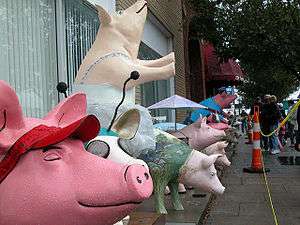
Pigs in the City is an art initiative held each summer in Lexington, and attracts tens of thousands of visitors.
In 2005, Davidson County Community College and the City of Thomasville formed a partnership for the creation of the Thomasville Artisan Center. This art studio allowed the College to reinvigorate its Associate in Fine Arts Degree and offer both university transfer classes as well as adult community interest classes in painting, drawing, and sculpting. The Artisan Center is part of the College's Thomasville Education Center complex which is part of the College's outreach to the community. The College has a second campus in Davie County in the city of Mocksville, as well as the Uptown Lexington Education Center, located within a few blocks of the Arts Center of Davidson County and the historic Court House.
Barbecue
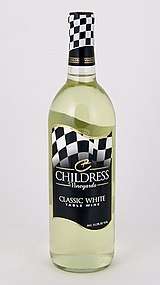
One of the two major styles of North Carolina barbecue originated in Lexington, the county seat and home to the annual Lexington Barbecue Festival. Therefore, many Lexington-style barbecue restaurants are found throughout the county. Some include Lexington BBQ ("Honeymonk's"), The BBQ Center, Jimmy's (closed and torn down in 2016), Whitley's BBQ Restaurant, Smokey Joe's, Backcountry, Speedy's, Smiley's, Tarheel Q, Stamey's, Kerley's, Welcome BBQ, and Cook's.
Richard Childress
Davidson County is home to many supporting race fans and the famous Richard Childress. Here you will find his personal Childress Vineyards and Richard Childress Racing Museum.
The Big Chair
Finally, Davidson County is known for its oversized chair, "The Big Chair." This chair is located in central Thomasville and is a symbol of Davidson County's furniture industry.
High Rock Lake
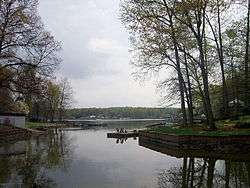
High Rock Lake is the northernmost of the Uwharrie Lakes and the second largest lake in North Carolina behind Lake Norman. Its water surface covers 15,180 acres (61.4 km2) and there are 365 miles (587 km) of shoreline. It begins at the confluence of the Yadkin River and the South Yadkin River. It has been the host of the Bassmaster Classic in 1994, 1995 and 1998.[17] and is the site of frequent other local angling competitions. Lexington is just north of the Abbotts Creek section of the lake.
Notable people
- Nia Franklin – Miss America 2019
- Wilmer "Vinegar Bend" Mizell- Professional Baseball player for the Pirates and Cardinals, and a Congressman who served three terms. (1930–1999)
- Max Lanier and son Hal Lanier, both Major League Baseball players are from Denton.[18]
- Eddie Mathews, Hall of Fame baseball player, played for Thomasville in 1949 before going
- Perry Tuttle – Former NFL & CFL wide receiver.
- Shy Tuttle – Defensive tackle for the New Orleans Saints
References
- "State & County QuickFacts". United States Census Bureau. Archived from the original on June 6, 2011. Retrieved October 19, 2013.
- "Find a County". National Association of Counties. Archived from the original on 2011-05-31. Retrieved 2011-06-07.
- "Davidson County Genealogy". North Carolina Genealogy. Archived from the original on 2011-04-30. Retrieved 2011-04-14.
- Gannett, Henry (1905). The Origin of Certain Place Names in the United States. Govt. Print. Off. pp. 101.
- Jack Scism, "Remember When?", Greensboro News & Record, January 23, 2011.
- Jack Scism, "Remember When?", Greensboro News & Record, February 6, 2011.
- "2010 Census Gazetteer Files". United States Census Bureau. August 22, 2012. Archived from the original on January 12, 2015. Retrieved January 14, 2015.
- "Population and Housing Unit Estimates". Retrieved April 30, 2020.
- "U.S. Decennial Census". United States Census Bureau. Retrieved January 14, 2015.
- "Historical Census Browser". University of Virginia Library. Retrieved January 14, 2015.
- Forstall, Richard L., ed. (March 27, 1995). "Population of Counties by Decennial Census: 1900 to 1990". United States Census Bureau. Retrieved January 14, 2015.
- "Census 2000 PHC-T-4. Ranking Tables for Counties: 1990 and 2000" (PDF). United States Census Bureau. April 2, 2001. Retrieved January 14, 2015.
- "U.S. Census website". United States Census Bureau. Retrieved 2008-01-31.
- Leip, David. "Dave Leip's Atlas of U.S. Presidential Elections". uselectionatlas.org. Retrieved 2018-03-15.
- "Everybody's Day | Thomasville, North Carolina Chamber of Commerce". www.everybodysday.com. Retrieved 2018-03-15.
- "Farmpark".
- Camping in Piedmont, North Carolina Archived 2005-02-14 at the Wayback Machine
- "Max Lanier History and Photos".
External links
- Davidson County and High Rock Lake Forum The best forum for information and news regarding Davidson County, High Rock Lake, and the surrounding communities
- Davidson County Tourism & Recreation Calendar of Events & more
- The Lexington Dispatch Local News and Features
- Davidson County government official website
- Live EMS Audio Feed Listen to Davidson County EMS online
- Davidson County Community College
- Thomasville City Schools
- Lexington City Schools
- Davidson County School System
- NCGenWeb Davidson County - free genealogy resources for the county
